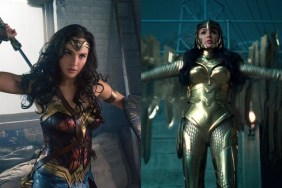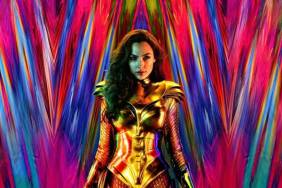Wonder Woman #7 is going to be a make or break issue for a lot of readers. Writer Brian Azzarello has been systematically tearing down a lot of the magic surrounding Wonder Woman while still keeping her firmly ensconced in the world of Greek mythology. He’s given Diana a father in Zeus and removed the mystical ‘made from clay and given life’ origin that helped make it so difficult to translate Wonder Woman into a palatable movie script. Now, he’s not only removed the ‘of truth’ portion from Diana’s lasso of truth, but he’s turned the entire Amazon culture into Sex Pirate Spartans.
I’m not kidding. Take a look at this excerpt from Wonder Woman #7, where Diana learns a new horrible truth about her sisters from Hephaestus.


So, let’s clarify this. Three times a century, the Amazons leave Themyscira en masse on pirate ships, commandeering other vessels, fucking them all orgy-style for their seed and then killing them. Then, when the children of this carnal slaughter are born, the girls are celebrated and the boys are traded to the blacksmith of the gods as servants in exchange for weaponry – and if that deal hadn’t been struck, they’d have just been outright killed.
Ick.
So it will all come down to how you feel about this massive shift in the perception of Amazon culture. On one hand, this sounds a lot like something that might happen in the twisted realms of Greek myth – and in ancient Greek reality, what with Sparta and all – and it fits in with Azzarello’s efforts to really play up these aspects of Wonder Woman’s life and to de-romanticize the Amazons by grounding them in a heightened reality which is often ugly. It also gives an explanation as to why Diana stands out so much among the Amazons – she is the daughter of Zeus, whereas most Amazons are the daughters of random crusty old sea dogs riddled with scurvy.
On the other hand, do we really want the Amazons de-romanticized? If so, do we want it done this much, to the point of turning a long-standing tradition of strong female warriors entirely independent of male influence on a mystical island lost in time into these monstrous ravagers completely willing to murder babies for an accident of birth? Should we blame Frank Miller and Zack Snyder for romanticizing the Spartans in the first place? What was once an inspiring culture to be fiercely proud of is now just an awful thing that’s as broken and crappy as every other attempt at civilization in our deeply flawed world. Sure, that’s probably the point, but it’s damn depressing to see it all torn down.
Also, in case you missed it in the wake of that stunning revelation, Azzarello also casually removes any truth-telling magic from Wonder Woman’s lasso by tying up Hephaestus and trying to force the truth out of him with it, and he just shrugs and says ‘Your weapon is intimidation. You blame the rope. That’s the truth.’ That carries weight, because Hephaestus is the one who made the lasso in the first place. Then again, that’s technically not stated outright – instead, Diana says her mother TOLD her it was made by Hephaestus and he doesn’t confirm or deny it, and considering how many things Diana has staunchly believed that have turned out to be lies in this book, maybe there’s another think coming about all that. The lasso still remains a powerful weapon, though, and we see Diana can use it as a very destructive whip, too.
The net result of all is that Wonder Woman #7, and most of the series, for that matter, hasn’t really been a pleasant read. It’s been interesting and unique enough to stick with this long, but Diana is trucking in a world that’s all ugly underbelly – and she’s about to journey into the literal underworld to boot. Cliff Chiang’s art has been really nice to look at, but it doesn’t entirely counteract the darkness pervading this book so much that reading about Wonder Woman feels kind of soul-crushing. It makes you long for some straight-forward heroing, but apparently, we’ll have to go read Justice League for that, and we all know how badly that’s turned out.
Sigh.








